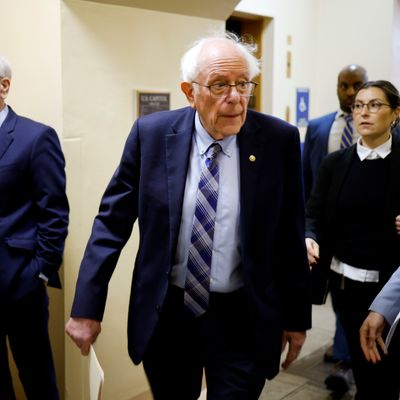
For weeks now, Democrats have been quarreling about why Kamala Harris lost to Donald Trump and the road to recovery in the future. By and large, progressives are repeating a couple of generations worth of arguments about how Democrats have let corporate elites lead them into globalist and centrist policies that alienate working-class voters. Centrists tend to point to extremist cultural positions and a general climate of “identity politics” foisted on Democrats by organized constituency groups. Most everyone has something negative to say about the Harris campaign itself, and there’s tons of blame left to cast in the direction of Joe Biden, who didn’t get out of the race fast enough and then kept butting back in.
But a bit of a strategic gap is opening up between Democrats on how to cope with Trump 2.0 and begin a Democratic Party comeback. By and large, centrists are calling for more aggressive outreach to the voters Democrats have lost to Trump, along with a tweaking of controversial cultural positions (especially the unconditional support for transgender rights that the Trump campaign pilloried effectively in a vast number of ads). These critics of “identity politics” are not, however, arguing for agreement with the MAGA folk in rejecting transgender rights entirely. For an example of Democrats willing to selectively embrace the Trump agenda more robustly, you have to look left, where there’s a lot of talk about coopting Trump’s more “populist” positions. Unsurprisingly, Bernie Sanders, who has always cast himself as more loyal to principle than to party, is leading the way, as in this expression of solidarity with the Elon Musk–Vivek Ramaswamy DOGE budget-slashing agenda, at least when it comes to the Pentagon:
Since the election Sanders has also, in tandem with his progressive Senate colleague Elizabeth Warren, expressed warm praise for Trump’s pledge to cap credit-card interest, an idea that horrifies Wall Street. As Politico reports, these gambits reflect a conscious strategy for future dealings with Trump:
Progressive Democrats wrestling with how to navigate a second Donald Trump presidency are settling on a new approach: Take his populist, working-class proposals at his word — or at least pretend to.
If he succeeds, they can take some credit for bringing him to the table. If he doesn’t, they can bash him for it.
An aide to a progressive member of Congress, who was granted anonymity to discuss internal strategy, stated the obvious: Liberal Democrats will continue to oppose most of what Trump does “tooth and nail.”
However, the person said, “For the few policy proposals that we think will help the working class, capping credit card interest rates being one of them, we’ll say, ‘Put up or shut up.’ Because if he does, it’s a great win for millions of people across this country. And if he doesn’t, it exposes him as a fraud that he is.”
This sounds ostensibly clever, but it may be too clever to work. Trump isn’t about to credit Democrats with “bringing him to the table” on his own campaign pledges, even if he chooses to keep them. He’s more likely to claim he’s split the Democratic Party with his working-class agenda and then make more demands of progressives. There is a reason that Republicans refused any cooperation with Democratic presidents Obama and Biden; opposition is the most obvious way to keep an opposition party united. And preemptive offers to support parts of Trump’s agenda even before he takes office arguably looks like an admission of weakness rather than a skillful thrust into the heart of the enemy’s base. It is very likely that Republicans will lump together acceptable and highly unacceptable proposals in big packages (e.g., Musk’s DOGE recommendations and a congressional budget-reconciliation bill) presented as take-it-or-leave-it indivisible expressions of MAGA governance.
Worse yet, the suggestion that Democratic and Republican “populists” share a point of view that excludes centrists of both parties (if there’s any such thing as a Republican centrist these days) would appear to reinforce the “horseshoe” theory that the left and right extremes converge. Are progressives really suggesting that Trump is closer to “the people” than their fellow Democrats? If so, they may be elevating intraparty maneuvering over the need to present a united front against a president and a party that wishes them the peace of the grave.
More on politics
- Trump Is Threatening to Invade Panama, Take Back Canal
- What Happened to Texas Congresswoman Kay Granger?
- Who Is Lara Trump and What’s With the Quashed Senate Rumors?






























